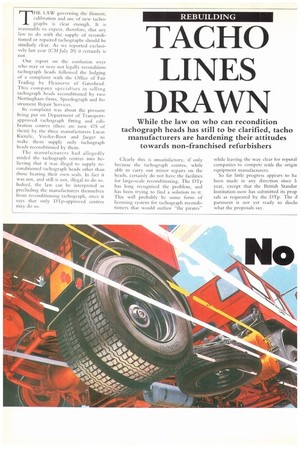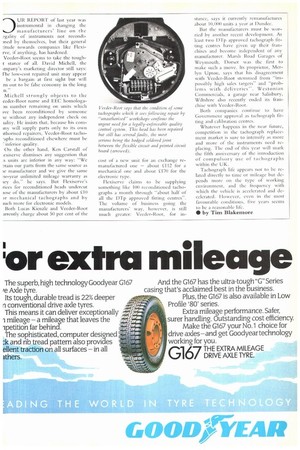TACHO LINES DRAWN
Page 36

Page 37

If you've noticed an error in this article please click here to report it so we can fix it.
While the law on who can recondition tachograph heads has still to be clarified, tacho manufacturers are hardening their attitudes towards non-franchised refurbishers
T m
HE LAW governing the fitment, calibration and use of new tacho graphs is clear enough. It is reasonable to expect, therefore, that any law to do with the supply of reconditioned or repaired tachographs should he similarly clear. As we reported exclusively last year (CM July 20) it certainly is not.
Our report on the confusion over who may or may not legally recondition tachograph heads followed the lodging of a complaint with the Office of Fair Trading by Flexiserve of Gateshead. This company specialises in selling tachograph heads reconditioned by two Nottingham firms, Speedograph and Instrument Repair Services.
Its complaint was about the pressure being put on Department of Transportapproved tachograph fitting and calibration centres (there are now 475 of them) by the three manufacturers Lucas Kienzle, Veeder-Root and Jaeger to make them supply only tachograph heads reconditioned by them.
The manufacturers had allegedly misled the tachograph centres into believing that it was illegal to supply reconditioned tachograph heads other than those bearing their own seals. In fact it was not, and still is not, illegal to do so. Indeed, the law can be interpreted as precluding the manufacturers themselves from reconditioning tachograph, since it says that only DTp-approved centres may do so. Clearly this is unsatisfactory, if only because the tachograph centres, while able to carry out minor repairs on the heads, certainly do not have the facilities for large-scale reconditioning. The DTp has long recognised the problem, and has been trying to find a solution to it. This will probably be some form of licensing system for tachograph reconditioners that would outlaw "the pirates" while leaving the way clear tbr reputat companies to compete with the origin equipment manufacturers.
So far little progress appears to ha been made in any direction since L year, except that the British Standar Institution now has submitted its prop sals as requested by the DTp. The d partment is not yet ready to disclo what the proposals say.
DUR REPORT of last year was instrumental in changing the manufacturers' line on the ..tgality of instruments not recondimed by themselves, but their general 7itude towards companies like Flexirve, if anything, has hardened.
Veeder-Root seems to take the toughstance of all. David Michell, the ,mpany's marketing director still says: [he low-cost repaired unit may appear be a bargain at first sight but will rn out to he false economy in the long n.
Michell strongly objects to the ceder-Root name and EEC homologa3n number remaining on units which Lye been reconditioned by someone se without any independent check on Jality. He insists that, because his cornmy will supply parts only to its own ithorised repairers. Veeder-Root tacho-aphs reconditioned elsewhere must be 7 inferior quality.
On the other hand, Ken Carstall of .exiserve dismisses any suggestion that .s units are inferior in any way: "We ptain our parts from the same source as le manufacturer and we give the same re-year unlimited mileage warranty as icy do," he says. But Flexiserve's rices for reconditioned heads undercut lose of the manufacturers by about £10 ir mechanical tachographs and by much more for electronic models.
Both Lucas Kienzle and Veeder-Root arrently charge about 50 per cent of the
Veeder-Root says that the condition of some tachographs which it sees /Mowing repair by "unauthorised" workshops cots firms the urgent need .I;)r a legally-enforceable quality control system. This head has been repaired but still has several faults, the most
serious being the bodged soldered joint between the flexible circuit and printed circuit board (arrowed).
cost of a new unit for an exchange remanufactured one — about 012 for a mechanical one and about i:170 for the electronic type.
Flexiserve claims to be supplying something like 100 reconditioned tachographs a month through "about half of all the DTp approved fitting centres". The volume of business going the manufacturers' way, however, is still much greater: Veeder-Root, for in stance, says it currently remanufactures about MAO units a year at Dundee.
But the manufacturers must be worried by another recent development. At least two Dip approved tachograph fitting centres have given up their franchises and become independent of any manufacturer. Marsh Road Garages of Weymouth, Dorset was the first to make such a move. Its proprietor, Merlyn Upton, says that his disagreement with Veeder-Root stemmed from "impossibly high sales targets" and "problems with deliveries''. Westonian Commercials, a garage near Salisbury, Wiltshire also recently ended its franchise with Veeder-Root.
Both companies continue to have Government approval as tachograph fitting and calibration centres.
Whatever happens in the near future, competition in the tachograph replacement market is sure to intensify as more and more of the instruments need replacing. The end of this year will mark the fifth anniversary of the introduction of compulsory use of tachographs within the UK.
Tachograph life appears not to be related directly to time or mileage but depends more on the type of working environment, and the frequency with which the vehicle is accelerated and decelerated. However, even in the most favourable conditions, five years seems to be a reasonable life.
• by Tim Blakemore




















































